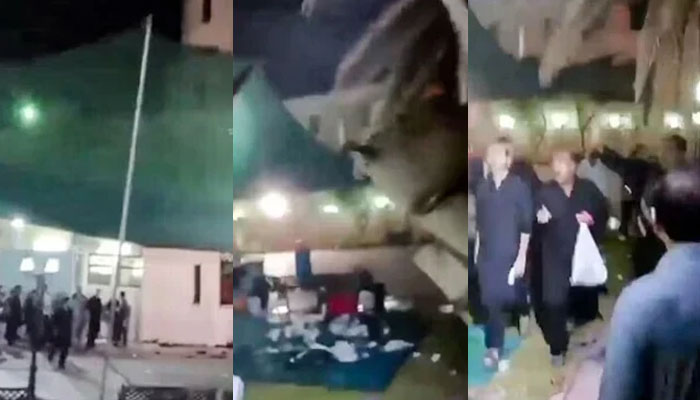Terror in Oman
Oman, known for its peace and harmony, saw deadly gun attack on Imam Ali Mosque in Muscat
In a world that is currently going through chaos and unrest; where a war in the Middle East is expanding; and where the former US president is not safe from assassination attempts, a gun attack doesn’t really make headlines for long. But a recent attack last week shocked many people: Oman, known for its peace and harmony, saw a deadly gun attack on the Imam Ali Mosque in Muscat, leading to the deaths of at least six people. Four Pakistanis were also among the dead. Although the attackers – three Omani brothers – were killed minutes after the attack, the incident has raised questions over the state of security in the small Arab country – also known as a bridge between Sunni-majority Saudi Arabia and Shia-majority Iran. The attackers were followers of ISIS – an extremist group that thrives on hate among different communities.
That the attack took place in the month of Muharram, when members of the Shia community conduct religious gatherings in mosques, makes the incident even more tragic. The ISIS ideology thrives on emotionally vulnerable young people. In January, the group carried out twin blasts in Iran as the country observed the death anniversary of its top commander Qassem Soleimani. Then, in March, it led an attack in Russia. The resurgence of ISIS rings alarm bells for the entire region. While analysts believe that a lone attack will not negatively affect Oman’s decade-long harmony among communities, it still shows that times may get tough. In Pakistan, the threat from IS-Khorasan is getting bigger.
But the main question is not whether IS/ISIS is still present in different countries but how the group is attracting so many people towards it. Social media platforms have become an affordable medium for most groups with extremist ideologies to further their message. Options like short videos with the right kind of music carry the potential to attract more people towards accounts instigating people to take up arms and spread terror. If the world is serious about defeating ISIS, it has to be more vigilant, ensuring that no platform hosts extremist ideas. Instead of focusing on which words users can use on social media sites, tech giants should do more about disabling accounts of people sowing seeds of hatred among users. There is also a need to recognize the transnational nature of the terror threat, which will require closer cooperation between countries to address. In this context, it is encouraging to see the Pakistani PM offering Oman support in eliminating terrorism in the aftermath of this attack. Only our collective action can help the world tackle the terror threat.
-
 Garrett Morris Raves About His '2 Broke Girls' Co-star Jennifer Coolidge
Garrett Morris Raves About His '2 Broke Girls' Co-star Jennifer Coolidge -
 Winter Olympics 2026: When & Where To Watch The Iconic Ice Dance ?
Winter Olympics 2026: When & Where To Watch The Iconic Ice Dance ? -
 Melissa Joan Hart Reflects On Social Challenges As A Child Actor
Melissa Joan Hart Reflects On Social Challenges As A Child Actor -
 'Gossip Girl' Star Reveals Why She'll Never Return To Acting
'Gossip Girl' Star Reveals Why She'll Never Return To Acting -
 Chicago Child, 8, Dead After 'months Of Abuse, Starvation', Two Arrested
Chicago Child, 8, Dead After 'months Of Abuse, Starvation', Two Arrested -
 Travis Kelce's True Feelings About Taylor Swift's Pal Ryan Reynolds Revealed
Travis Kelce's True Feelings About Taylor Swift's Pal Ryan Reynolds Revealed -
 Michael Keaton Recalls Working With Catherine O'Hara In 'Beetlejuice'
Michael Keaton Recalls Working With Catherine O'Hara In 'Beetlejuice' -
 King Charles, Princess Anne, Prince Edward Still Shield Andrew From Police
King Charles, Princess Anne, Prince Edward Still Shield Andrew From Police -
 Anthropic Targets OpenAI Ads With New Claude Homepage Messaging
Anthropic Targets OpenAI Ads With New Claude Homepage Messaging -
 US Set To Block Chinese Software From Smart And Connected Cars
US Set To Block Chinese Software From Smart And Connected Cars -
 Carmen Electra Says THIS Taught Her Romance
Carmen Electra Says THIS Taught Her Romance -
 Leonardo DiCaprio's Co-star Reflects On His Viral Moment At Golden Globes
Leonardo DiCaprio's Co-star Reflects On His Viral Moment At Golden Globes -
 SpaceX Pivots From Mars Plans To Prioritize 2027 Moon Landing
SpaceX Pivots From Mars Plans To Prioritize 2027 Moon Landing -
 King Charles Still Cares About Meghan Markle
King Charles Still Cares About Meghan Markle -
 J. Cole Brings Back Old-school CD Sales For 'The Fall-Off' Release
J. Cole Brings Back Old-school CD Sales For 'The Fall-Off' Release -
 GTA 6 Built By Hand, Street By Street, Rockstar Confirms Ahead Of Launch
GTA 6 Built By Hand, Street By Street, Rockstar Confirms Ahead Of Launch




